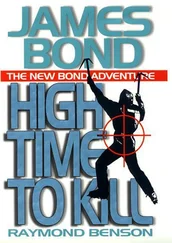Raymond Benson - Doubleshot
Здесь есть возможность читать онлайн «Raymond Benson - Doubleshot» весь текст электронной книги совершенно бесплатно (целиком полную версию без сокращений). В некоторых случаях можно слушать аудио, скачать через торрент в формате fb2 и присутствует краткое содержание. Год выпуска: 2000, ISBN: 2000, Издательство: Jove, Жанр: Старинная литература, на английском языке. Описание произведения, (предисловие) а так же отзывы посетителей доступны на портале библиотеки ЛибКат.
- Название:Doubleshot
- Автор:
- Издательство:Jove
- Жанр:
- Год:2000
- ISBN:9780515130614
- Рейтинг книги:4 / 5. Голосов: 1
-
Избранное:Добавить в избранное
- Отзывы:
-
Ваша оценка:
- 80
- 1
- 2
- 3
- 4
- 5
Doubleshot: краткое содержание, описание и аннотация
Предлагаем к чтению аннотацию, описание, краткое содержание или предисловие (зависит от того, что написал сам автор книги «Doubleshot»). Если вы не нашли необходимую информацию о книге — напишите в комментариях, мы постараемся отыскать её.
Doubleshot — читать онлайн бесплатно полную книгу (весь текст) целиком
Ниже представлен текст книги, разбитый по страницам. Система сохранения места последней прочитанной страницы, позволяет с удобством читать онлайн бесплатно книгу «Doubleshot», без необходимости каждый раз заново искать на чём Вы остановились. Поставьте закладку, и сможете в любой момент перейти на страницу, на которой закончили чтение.
Интервал:
Закладка:
Bond negotiated a price of two hundred dirhams for the taxi driver to take him to Tangier. It was a twenty-minute ride, and the landscape was atypical for what one might expect from a port city like Tangier. The countryside was hilly and green, dotted with the occasional shepherd in the distance. There was surprisingly little development out this way, but the city was suddenly upon them. Bond felt the change in the atmosphere, for Tangier was famous for its unique, decaying character of the post-Interzone days.
People from all over the world have inhabited the port for over 2,500 years. During the days when resident diplomatic agents of a number of countries controlled Tangier, it was known as an “international zone.” Then, every kind of dubious activity developed in the port, including money laundering, smuggling, currency speculation, arms dealing, prostitution, and slave trading. It was also a fashionable resort haven for artists, writers, refugees, exiles, and bankers. When Tangier was reunited with the rest of Morocco in 1956, this notoriety fell by the wayside, but the legends lived on.
Bond had been to Tangier a number of times and he was always put off by the amount of hustling that went on. The trick, Bond had learned, was not to act or look like a tourist. Because Bond had black hair and a relatively tanned complexion, it wasn’t immediately obvious that he was British. A glare from his cold, steely eyes also worked to dissuade faux guides from offering to “show him the medina.”
The driver let him off in the Grand Socco, a poor imitation of the famed Djemaa el-Fna in Marrakesh, where snake charmers, musicians, storytellers, makeshift shops, and food stalls filled the air with smells, noise, and spectacle. Outside the chemist’s was a group of tattoo-faced Berber women dressed in traditional izars or haïks, hoping to secure a housecleaning job. A Moorish horseshoe arch led from the Grand Socco into the medina, the city’s oldest quarter. Navigation by foot, bicycle, motorcycle, or donkey cart were the only options in this labyrinth of narrow passages and winding paths.
Bond walked into the medina, shaking his head at a man who wanted to “show you something special, my friend,” and moved past the numerous shop fronts where anything and everything was sold. The small streets were full of donkeys and cats, beggars and children, hawkers and tourists. It was the smell of the place, in particular, that seemed to be a common trait with all of the medinas in Morocco. The fresh fish, meats, and spices combined with the surrounding humanity to create a confusion of odors that, to Bond, smelled of rotten eggs mixed with incense and urine.
Bond made his way deep into the medina to the busy little square known as the Petit Socco. Children were kicking a ball back and forth between the constant movement of carts and wagons, women dressed in caftans and veils who were buying the day’s produce, and “students” looking for tourists to befriend. He passed the Pension Fuentes, which had been one of Tangier’s luxury hotels at the end of the nineteenth century. At that time, the medina was the sole center of activity and the city’s administration was established there. Important international offices had once resided in the medina, such as the old American Legation, which was now a museum. This all came to an end when the ville nouvelle was built at the beginning of the new century.
At first Bond thought he might have taken a wrong turn, but then he recognized some landmarks and continued on his way up Rue de Almohades to a three-story Berber house. Built around a courtyard, the square structure had high ramparts and corner towers. Magnificent, colorful, handmade carpets hung on the outside, and the ground floor was covered with arts and crafts, from textiles to pottery and ceramics. Brass and copperware were abundant, and jewelry, woodwork, and basketware dominated the premises. Everything was of very high quality.
A teenage boy approached Bond, saying in English, “Come in, sir, come in. Español? American? We have best prices in Tangier. You like carpets? Please, we give you free demonstration.”
“No, thank you,” Bond said. “I’mhere to see Latif Reggab. Is he here?”
“Yes, sir, he is always here. Please, come in and look around. I will find him for you.”
The walls and floor of the room were decorated in the intricate and exquisite tile work that was prevalent in Moroccan architecture. The smell of incense was stronger inside, covering the foul odors of the medina. A few American tourists were haggling with a shopkeeper over the price of a black leather jacket. Some Spaniards were admiring the precious stones that were protected in a glass case.
“ As-salaam ‘alaykum, may I help you?” said a familiar voice behind Bond.
He turned to see a rather short man in his fifties. He was dressed in the traditional white jellaba, wore glasses, had dark, curly hair flecked with gray, and large brown eyes with an unusual bluish tint. His skin color was light, as was common among indigenous Berber people. When the man saw who it was standing in his shop, he beamed.
“Well, Allah be praised. I don’t believe it!”
“Hello, Latif,” Bond said. “It’s been a long time.”
“James Bond, as I live and breathe. Welcome!” Latif Reggab laughed heartily and embraced Bond warmly, planting kisses on both cheeks. “Why didn’t you let me know you were coming?”
“I couldn’t, for security reasons,” Bond said, quietly, as he glanced around to make sure no one was listening. “Latif, I need your help. I need a place to stay while I’m here, and no one must know about it.”
“Of course, of course! No problems. You are always welcome here. Consider this your own personal funduq. ” Latif was referring to the smelly “motels” used by caravans.
“And,” Bond added, “I would also appreciate it if London didn’t know I was here as well.”
Latif grinned conspiratorially and said, “Oh, are we up to some kind of international intrigue? Are you in pursuit of dangerous terrorists? Has the spy network returned to Tangier?”
Bond laughed. “Not quite. Let’s just say that I’m on a personal mission. So, tell me, Latif, how are things in T Branch of Station NA?
How is your family?”
“Come upstairs, James, please, and I’ll tell you.” He led Bond up the flights of stairs, past the carpet and rug gallery on the first floor, upward beyond the living quarters, and onto the flat roof, where several carpets had been hung or laid out to dry in the sun. On the way, Latif had barked an order in Arabic to a young man on the second floor.
They could see the entire medina from this height. It looked much as it did hundreds of years ago, with the crowded clusters of flat rooftops, hanging laundry, and the occasional minaret. The only difference was that now most of the rooftops were sprinkled with television aerials or satellite dishes.
“My family is wonderful,” Latif answered. “My wife is still beautiful and my children are almost all grown. My eldest has already made me a grandfather. You met my youngest son earlier. That was Hussein.”
“My lord, the last time I saw him, he was—” Bond held his hand at his waist to indicate the boy’s height.
“Yes, they grow like wildflowers, these kids.”
“Grandpa, eh?”
“Yes, it’s a blessing,” Latif said, smiling broadly, revealing large, yellow teeth. “Anyway, they’re all fine, and the branch is fine, too. To tell the truth, I am very bored with intelligence work. Most of the time these days I simply run my shop and sell beautiful carpets to tourists. There is hardly anything for me to do anymore. Most of the North Africa station’s activity is concentrated in Egypt now; we never have any excitement in Morocco. I’m hoping you have some excitement up your sleeve and that you will allow me to have some of it.”
Читать дальшеИнтервал:
Закладка:
Похожие книги на «Doubleshot»
Представляем Вашему вниманию похожие книги на «Doubleshot» списком для выбора. Мы отобрали схожую по названию и смыслу литературу в надежде предоставить читателям больше вариантов отыскать новые, интересные, ещё непрочитанные произведения.
Обсуждение, отзывы о книге «Doubleshot» и просто собственные мнения читателей. Оставьте ваши комментарии, напишите, что Вы думаете о произведении, его смысле или главных героях. Укажите что конкретно понравилось, а что нет, и почему Вы так считаете.












